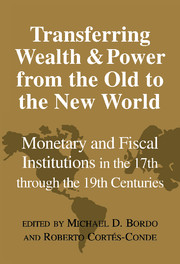 Transferring Wealth and Power from the Old to the New World
Transferring Wealth and Power from the Old to the New World Published online by Cambridge University Press: 27 March 2010
INTRODUCTION
The development of economic institutions in Argentina was driven both by factors particular to the conditions of the region and to the structure of the viceroyalty from which Argentina grew and by economic pressures of a larger scale. For this reason, our chapter contains two parts comprising Sections 11.2 to 11.8. The first is a detailed discussion of the conflicts and pressures inherent in the economic structures and institutions of the colonial administration and of the attempts by the new nation, Argentina, to mold these institutions into, or replace them by, something more consistent with the emerging realities. The sources of these new institutions are of primary interest. The second, consisting of Section 11.9, presents a formalized dynamic economic/political model that is intended to highlight some of the claims of the first part. In particular, the importance of distance and the ability of the government to collect and utilize taxes and to deliver services are shown to be sufficient to generate outcomes that mimic the main flow of much of Argentina's economic history.
THE IMPERIAL ADMINISTRATION (1620–1776)
The Spanish brought to America the institutions they knew from Castilla, which they had developed over the centuries of the Reconquest. In the vast New World, these institutions changed as a result of a variety of circumstances, important among which were those that resulted from the nature of the resources that the Spanish encountered.
To save this book to your Kindle, first ensure [email protected] is added to your Approved Personal Document E-mail List under your Personal Document Settings on the Manage Your Content and Devices page of your Amazon account. Then enter the ‘name’ part of your Kindle email address below. Find out more about saving to your Kindle.
Note you can select to save to either the @free.kindle.com or @kindle.com variations. ‘@free.kindle.com’ emails are free but can only be saved to your device when it is connected to wi-fi. ‘@kindle.com’ emails can be delivered even when you are not connected to wi-fi, but note that service fees apply.
Find out more about the Kindle Personal Document Service.
To save content items to your account, please confirm that you agree to abide by our usage policies. If this is the first time you use this feature, you will be asked to authorise Cambridge Core to connect with your account. Find out more about saving content to Dropbox.
To save content items to your account, please confirm that you agree to abide by our usage policies. If this is the first time you use this feature, you will be asked to authorise Cambridge Core to connect with your account. Find out more about saving content to Google Drive.